Dear Z, Today’s Lovers’ Chronicle from Mac Tag to his muse. Hope you had a good day! Rhett
The Lovers’ Chronicle
Dear Muse,
i thought i knew
what it was to be,
beyond reservations
totally with another
where days were not
born of ordinariness
i read about it
did a lot of pretendin’
i knew, but i never
even caught a glimpse
until now
in the presence
of you
© copyright 2021.2023 mac tag/cowboycoleridge all rights reserved
Pale Love, Pale Rider
© copyright 2020 mac tag/cowboy coleridge all rights reseerved
conscious, or not,
that my thoughts between,
tell me that we shall know
these stories, told
over many years
that now
we can embrace, knowin’
which goes first through the doorway, biddin’
goodnight, and which stays on a while alone
and all this through your eyes have stopped your fears
© copyright 2019 mac tag/cowboy coleridge all rights reserved
the sudden dances
were always my favorites
how they mocked time,
and fate
i once knew how deeply,
fearfully and totally
beyond compromise,
beyond reservations
when the sighs
were not born
of ordinariness
and now to be in the present
havin’ lived through
years in darkness
and emerged
with my mind fairly sound
well, not sure much more
can i ask or hope
© copyright 2018 mac tag/cowboy coleridge all rights reserved
tried livin’ at the pitch
that is near madness
but there was too much
hangin’ on for dear life
almost to the end
thought it was what
i was supposed to do
thought i had to
and no one ever
intervened
to try to stop it,
to say; for the love
of god man, just stop
until now
hope it is not too late
© copyright 2017 mac tag/cowboy Coleridge all rights reserved
After an absence
We are still each other
Wave on wave of memories
Ebb and flow to the time when
We were not apart
Wave on wave of visions of you
Wash up on my desolate shores
And I feel myself… I feel again
© copyright 2016 mac tag/cowboy coleridge all rights reserved
| Thomas Moore | |
|---|---|
 |
|
Today is the birthday of Thomas Moore (Dublin 28 May 1779 – 25 February 1852 Sloperton Cottage, Bromham, Wiltshire, England); poet, singer, songwriter, and entertainer.
Married to Elizabeth “Bessy” Dyke, a Protestant actress, and hailed as “Anacreon Moore” after the classical Greek composer of drinking songs and erotic verse, Moore did not profess religious piety. Yet in the controversies that surrounded Catholic Emancipation Moore was seen to defend the tradition of the Church in Ireland against both evangelising Protestants and uncompromising lay Catholics.
Moore married Bessy in St Martin-in-the-Fields, London. Together with Bessy’s lack of a dowry, the Protestant ceremony may have been the reason why Moore kept the match for some time secret from his parents. Bessy shrank from fashionable society to such an extent that many of her husband’s friends never met her (some of them jokingly doubted her very existence). Those who did held her in high regard.
The couple first set up house in London, then in the country at Kegworth, Leicestershire, and in Lord Moira’s neighbourhood at Mayfield Cottage in [Staffordshire], and finally in Sloperton Cottage in Wiltshire near the country seat of another close friend, Henry Petty-Fitzmaurice, 3rd Marquess of Lansdowne. Tom and Bessy had five children, none of whom survived them. Three girls died young, and both sons lost their lives as young men. One of them, Tom, died in some disgrace as a French Foreign Legionnaire in Algeria. Despite these heavy personal losses, the marriage is generally regarded to have been a happy one.
Today Moore is remembered almost alone either for his Irish Melodies (typically “The Minstrel Boy” and “The Last Rose of Summer”) or, less generously, for the role he is thought to have played with John Murray in the loss of the memoirs of his friend Lord Byron.
Verse
- And the best of all ways
To lengthen our days
Is to steal a few hours from the night, my dear!- The Young May Moon, st. 1.
- You may break, you may shatter the vase, if you will,
But the scent of the roses will hang round it still.- Farewell! But Whenever You Welcome the Hour, st. 3.
- No eye to watch, and no tongue to wound us
All earth forgot, and all heaven around us.- Come O’er the Sea, st. 2.
- The light that lies
In woman’s eyes,
Has been my heart’s undoing.- The Time I’ve Lost in Wooing, st. 1.
- My only books
Were woman’s looks,
And folly’s all they’ve taught me.- The Time I’ve Lost in Wooing, st. 1.
| Carl Larsson | |
|---|---|

Self-portrait (1895)
|
|
Today is the birthday of Carl Larsson (Stockholm 28 May 1853 – 22 January 1919 Falun); painter representative of the Arts and Crafts Movement. His many paintings include oils, watercolors, and frescoes. He considered his finest work to be Midvinterblot (Midwinter Sacrifice), a large painting now displayed inside the Swedish National Museum of Fine Arts.
After spending two summers in Barbizon, the refuge of the plein-air painters, he settled down with his Swedish painter colleagues in 1882 in Grez-sur-Loing, at a Scandinavian artists’ colony outside Paris. It was there that he met the artist Karin Bergöö, who soon became his wife. This was to be a turning point in Larsson’s life. In Grez, Larsson painted some of his most important works, now in watercolour and very different from the oil painting technique he had previously employed.
Gallery

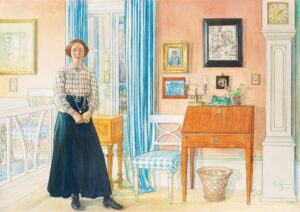
Brita in the drawing room
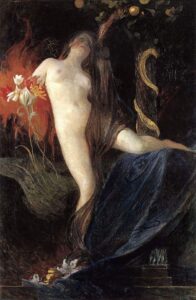
-
Martina with the breakfast tray.

Self portrait from 1906
-

Nameday at the storage house
-
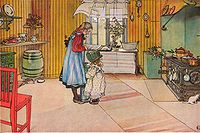
The kitchen
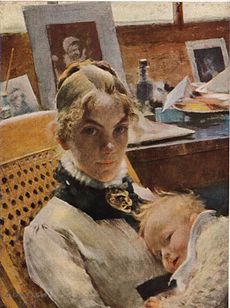
-

Carl Larsson’s bed
-

“Cosy Corner.” From A Home (26 watercolours)
-

Summer morning (at Spardavet)
-

Flowers on the windowsill
-

Breakfast under the big birch, 1896 (“Frukost under stora björken“)
-
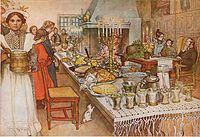
Christmas Eve (1904–1905)
-

Model writing postcards
-

Carl Larsson’s studio
-
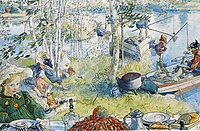
Cray fishing with the family

Today is the birthday of Ian Fleming (Ian Lancaster Fleming 28 May 1908 – 12 August 1964); author, journalist and naval intelligence officer, perhaps best known for his James Bond series of spy novels. Fleming came from a wealthy family connected to the merchant bank Robert Fleming & Co., and his father was the Member of Parliament for Henley from 1910 until his death on the Western Front in 1917. Educated at Eton, Sandhurst and, briefly, the universities of Munich and Geneva, Fleming moved through several jobs before he started writing.
While working for Britain’s Naval Intelligence Division during the Second World War, Fleming was involved in planning Operation Goldeneye and in the planning and oversight of two intelligence units, 30 Assault Unit and T-Force. His wartime service and his career as a journalist provided much of the background, detail and depth of the Bond novels.
Fleming wrote his first Bond novel, Casino Royale, in 1952. It was a success, with three print runs being commissioned to cope with the demand. Eleven Bond novels and two collections of short stories followed between 1953 and 1966. The novels revolved around James Bond, an officer in the Secret Intelligence Service, commonly known as MI6. Bond was also known by his code number, 007, and was a commander in the Royal Naval Reserve. The Bond stories rank among the best-selling series of fictional books of all time, having sold over 100 million copies worldwide. Fleming also wrote the children’s story Chitty-Chitty-Bang-Bang and two works of non-fiction.
Fleming was married to Ann Charteris, who was divorced from the second Viscount Rothermere because of her affair with the author. Fleming and Charteris had a son, Caspar. Fleming was a heavy smoker and drinker for most of his life and succumbed to heart disease in 1964 at the age of 56. Two of his James Bond books were published posthumously; other writers have since produced Bond novels. Fleming’s creation has appeared in film twenty-six times, portrayed by seven actors.

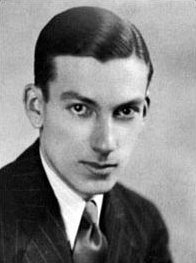
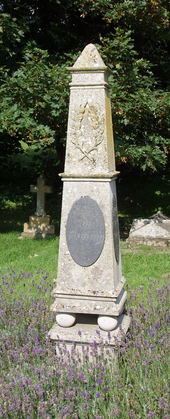
Fleming was a heavy smoker and drinker throughout his adult life, and suffered from heart disease. In 1961, aged 53, he suffered a heart attack and struggled to recuperate. On 11 August 1964, while staying at a hotel in Canterbury, Fleming went to the Royal St George’s Golf Club for lunch and later dined at his hotel with friends. The day had been tiring for him, and he collapsed with another heart attack shortly after the meal. Fleming died at age 56 in the early morning of 12 August 1964—his son Caspar’s twelfth birthday. His last recorded words were an apology to the ambulance drivers for having inconvenienced them, saying “I am sorry to trouble you chaps. I don’t know how you get along so fast with the traffic on the roads these days.” Fleming was buried in the churchyard of Sevenhampton, near Swindon.
Casino Royale (1953)
- The scent and smoke and sweat of a casino are nauseating at three in the morning. Then the soul erosion produced by high gambling — a compost of greed and fear and nervous tension — becomes unbearable and the senses awake and revolt from it.
- Opening line, Ch. 1 : The Secret Agent
- Against the background of this luminous and sparkling stage Bond stood in the sunshine and felt his mission to be incongruous and remote and his dark profession an affront to his fellow actors.
- Ch. 5 : The Girl From Headquarters
- Bond insisted ordering Leiter’s Haig-and-Haig “on the rocks” and then he looked carefully at the barman. “A Dry Martini”, he said. “One. In a deep champagne goblet.” “Oui, monsieur.” “Just a moment. Three measures of Gordons, one of vodka, half a measure of Kina Lillet. Shake it very well until it’s ice-cold, then add a large thin slice of lemon peel. Got it?” “Certainly, monsieur.” The barman seemed pleased with the idea.
- Ch. 7 : Rouge et Noir
- I take a ridiculous pleasure in what I eat and drink. It comes partly from being a bachelor, but mostly from a habit of taking a lot of trouble over details. It’s very pernickety and oldmaidish really, but then when I’m working I generally have to eat my meals alone and it makes them more interesting when one takes trouble.
- Ch. 8 : Pink Lights And Champagne
- This country-right-or-wrong business is getting a little out-of-date. Today we are fighting Communism. Okay. If I’d been alive fifty years ago, the brand of Conservatism we have today would have been damn near called Communism and we should have been told to go and fight that. History is moving pretty quickly these days and the heroes and villains keep on changing parts.
- Ch. 20 : The Nature Of Evil
- ‘I’m wondering whose side I ought to be on. I’m getting very sorry for the Devil and his disciples such as the good Le Chiffre. The Devil has a rotten time and I always like to be on the side of the underdog. We don’t give the poor chap a chance. There’s a Good Book about goodness and how to be good and so forth, but there’s no Evil Book about evil and how to be bad. The Devil has no prophets to write his Ten Commandments and no team of authors to write his biography. His case has gone completely by default. We know nothing about him but a lot of fairy stories from our parents and schoolmasters. He has no book from which we can learn the nature of evil in all its forms, with parables about evil people, proverbs about evil people, folk-lore about evil people. All we have is the living example of the people who are least good, or our own intuition.
‘So,’ continued Bond, warming to his argument, ‘Le Chiffre was serving a wonderful purpose, a really vital purpose, perhaps the best and highest purpose of all. By his evil existence, which foolishly I have helped to destroy, he was creating a norm of badness by which, and by which alone, an opposite norm of goodness could exist. We were privileged, in our short knowledge of him, to see and estimate his wickedness and we emerge from the acquaintanceship better and more virtuous men.’- Ch. 20 : The Nature Of Evil
- “Surround yourself with human beings, my dear James. They are easier to fight for than principles.”
He laughed. “But don’t let me down and become human yourself. We would lose a wonderful machine.”- Ch. 20 : The Nature Of Evil
- It was the same with the whole Russian machine. Fear was the impulse. For them it was always safer to advance than retreat. Advance against the enemy and the bullet might miss you. Retreat, evade, betray and the bullet would never miss.
- Ch. 27 : The Bleeding Heart
- The bitch is dead now.
- Closing line, Ch. 27 : The Bleeding Heart
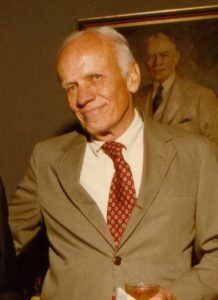 Today is the birthday of Walker Percy, Obl.S.B. (Birmingham, Alabama, May 28, 1916 – May 10, 1990 Covington, Mississippi); author whose interests included philosophy and semiotics. Percy is known for his philosophical novels set in and around New Orleans, Louisiana, the first of which, The Moviegoer, won the U.S. National Book Award for Fiction. He devoted his literary life to the exploration of “the dislocation of man in the modern age.” His work displays a combination of existential questioning, Southern sensibility, and deep Catholic faith.
Today is the birthday of Walker Percy, Obl.S.B. (Birmingham, Alabama, May 28, 1916 – May 10, 1990 Covington, Mississippi); author whose interests included philosophy and semiotics. Percy is known for his philosophical novels set in and around New Orleans, Louisiana, the first of which, The Moviegoer, won the U.S. National Book Award for Fiction. He devoted his literary life to the exploration of “the dislocation of man in the modern age.” His work displays a combination of existential questioning, Southern sensibility, and deep Catholic faith.
The Moviegoer (1961)
- Hatred strikes me as one of the few signs of life remaining in the world. This is another thing about the world which is upside down: all the friendly and likable people seem dead to me; only the haters seem alive. (2.9).
- I had discovered that a person does not have to be this or be that or be anything, not even oneself. One is free. (2.12).
- She refers to a phenomenon of movie going which I have called certification. Nowadays when a person lives somewhere, in a neighborhood, the place is not certified for him. More than likely he will live there sadly and the emptiness which is inside him will expand until it evacuates the entire neighborhood. But if he sees a movie which shows his very neighborhood, it becomes possible for him to live, for a time at least, as a person who is Somewhere and not Anywhere. (1.7).
- I have discovered that most people have no one to talk to, no one, that is, who really wants to listen. When it does at last dawn on a man that you really want to hear about his business, the look that comes over his face is something to see.
- A repetition is the re-enactment of past experience toward the end of isolating the time segment which has lapsed in order that it, the lapsed time, can be savored of itself and without the usual adulteration of events that clog time like peanuts in brittle.
- The enduring is something which must be accounted for. One cannot simply shrug it off.
- She can only believe I am serious in her own fashion of being serious: as an antic sort of seriousness, which is not seriousness at all but despair masquerading as seriousness.
- As for hobbies, people with stimulating hobbies suffer from the most noxious of despairs since they are tranquilized in their despair.
- Oh the crap that lies lurking in the English soul. Somewhere it, the English soul, received an injection of romanticism which nearly killed it.
- A good rotation. A rotation I define as the experiencing of the new beyond the expectation of the experiencing of the new.
- Christians talk about the horror of sin, but they have overlooked something. They keep talking as if everyone were a great sinner, when the truth is that nowadays one is hardly up to it. There is very little sin in the depths of the malaise. The highest moment of a malaisian’s life can be the moment when he manages to sin like a proper human (Look at us, Binx — my vagabond friends as good as cried out to me — we’re sinning! We’re succeeding! We’re human after all!).
- Not a single thing do I remember from the first trip but this: the sense of the place, the savor of the genie-soul of the place which every place has or else is not a place…there it is as big as life, the genie-soul of the place which, wherever you go, you must meet and master first thing or be met and mastered. (4.3).
- My aunt is convinced I have a “flair for research.” This is not true. If I had a flair for research, I would be doing research. Actually I’m not very smart. My grades were average. My mother and my aunt think I am smart because I am quiet and absent-minded–and because my father and grandfather were smart. They think I was meant to do research because I am not fit to do anything else–I am a genius whom ordinary professions can’t satisfy.
- For some time now the impression has been growing upon me that everyone is dead. It happens when I speak to people. In the middle of a sentence it will come over me: yes, beyond a doubt this is death. There is little to do but groan and make an excuse and slip away as quickly as one can.
- To tell the absolute truth, I’ve always been slightly embarrassed by Walter’s company. Whenever I’m with him, I feel the stretch of the old tightrope, the necessity of living up to the friendship of friendships, of cultivating an intimacy beyond words. The fact is that we have little to say to each other. There is only this thick sympathetic silence between us. We are comrades, true, but somewhat embarrassed comrades. It is probably my fault. For years now I have had no friends. I spend my entire time working, making money, going to movies and seeking the company of women.
- Beauty is a whore.
- Today is my thirtieth birthday and I sit on the ocean wave in the schoolyard and wait for Kate and think of nothing. Now in the thirty-first year of my dark pilgrimage on this earth and knowing less than I ever knew before, having learned only to recognize merde when I see it, having inherited no more from my father than a good nose for merde, for every species of shit that flies – my only talent – smelling merde from every quarter, living in fact in the very century of merde, the great shithouse of scientific humanism where needs are satisfied, everyone becomes an anyone, a warm and creative person, and prospers like a dung beetle, and one hundred percent of people are humanists and ninety-eight percent believe in God, and men are dead, dead, dead; and the malaise has settled like a fall-out and what people really fear is not that the bomb will fall but that the bomb will not fall – on this my thirtieth birthday, I know nothing and there is nothing to do but fall prey to desire.
- The search is what anyone would undertake if he were not sunk in the everydayness of his own life.
- To become aware of the possibility of the search is to be onto something. Not to be onto something is to be in despair. The movies are onto the search, but they screw it up. The search always ends in despair. They like to show a fellow coming to himself in a strange place-but what does he do? He takes up with the local librarian, sets about proving to the local children what a nice fellow he is, and settles down with a vengeance. In two weeks time he is so sunk in everydayness that he might just as well be dead.
The Last Gentleman (1966)
- What a man can be the next minute bears no relation to what he is or what he was the minute before.
- He was a young man of pleasant appearance. Of medium height and exceedingly pale, he was nevertheless strongly built and quick and easy in his ways. Save for his deafness in one ear, his physical health was perfect. Handsome as he was, he was given to long silences. So girls didn’t know what to make of him. But men liked him. After a while they saw that he was easy and meant no harm. He was the sort whom classmates remember fondly; they liked to grab him around the neck with an elbow and cuff him around. Good-looking and amiable as he was, however, he did not strike one as remarkable. People usually told him the same joke two or three times.
- Once again he began to feel bad in the best of environments. And he noticed that other people did too. So bad did they feel, in fact, that it took the worst of news to cheer them up. On the finest mornings he noticed that people in the subway looked awful until they opened their newspapers and read of some airliner crashing and killing all hundred and seven passengers. Where there had been misery in their happiness, now as they shook their heads dolefully at the tragedy they became happy in their misery.
- Christ should leave us. He is too much with us and I don’t like his friends. We have no hope of recovering Christ until Christ leaves us. There is after all something worse than being God-forsaken. It is when God overstays his welcome and take up with the wrong people.
- It was no more nor less than true. You do things by doing things, not by not doing them. No more crazy upsidedownness, he resolved. Good was better than bad. Good environments are better than bad environments.
- He could tell that the other expected him to be surprised, but it was not in him to be surprised because it was no more surprising to him when things did not fall out as they were supposed to than when they did.
The Message in the Bottle (1975)
- Where does one start with a theory of man if the theory of man as an organism in an environment doesn’t work and all the attributes of man which were accepted in the old modern age are now called into question: his soul, mind, freedom, will, Godlikeness?
There is only one place to start: the place where man’s singularity is there for all to see and cannot be called into question, even in a new age in which everything else is in dispute.
That singularity is language…
- Why is there such a gap between nonspeaking animals and speaking man, when there is no other such gap in nature?
Is it possible that a theory of man is nothing more nor less than a theory of the speaking creatures?
The Second Coming (1980)
- You can get all A’s and still flunk life.
- The lives of other people seemed even more farcical than his own. It astonished him that as farcical as most people’s live were, they generally gave no sign of it. Why was it that it was he not they who had decided to shoot himself? How did they manage to deceive themselves and even appear to live normally, work as usual, play golf, tell jokes, argue politics? Was he crazy or was it rather the case that other people went to any length to disguise from themselves the fact that their lives were farcical? He couldn’t decide.
- Peace is only better than war if peace is not hell too. War being hell makes sense.
- You don’t ever really learn anything you didn’t know when you were thirteen.
- What struck him was not sadness or remorse or pity but the wonder of it. How can it be? How can it happen that one day you are young, you marry, and then another day you come to yourself and your life has passed like a dream? They looked at teach other curiously and wondered how they could have missed each other, lived in the same house all those years and passed in the hall like ghosts.
- He thought he was a good poet but he was not. He thought books could tell him how to live but they couldn’t. He was a serious but dazed reader. He read Dante and Shakespeare and Nietzsche and Freud. He read modern poetry and books on psychiatry. He had taken a degree in English, couldn’t, decided to farm, bought a goat farm, managed a Confederate museum in a cave on his property, wrote poetry, went broke, became a golf pro.
- In all honesty it was easier to believe it in cool Long Island for its very outrageousness where nobody believed anything very seriously than in hot Carolina where everybody was a Christian and found unbelief unbelievable.
Lost in the Cosmos: The Last Self-Help Book (1983)
- Why it is that of all the billions and billions of strange objects in the Cosmos — novas, quasars, pulsars, black holes — you are beyond doubt the strangest?
- Why is it that one can look at a lion or a planet or an owl or at someone’s finger as long as one pleases, but looking into the eyes of another person is, if prolonged past a second, a perilous affair?
- There is no fashion so absurd, even grotesque, that it cannot be adopted, given two things: the authority of the fashion-setter (Dior, Jackie Onassis) and the vacuity or noughtness of the consumer.
- Chapter 2, section 2: The Self as Nought (II).
Today is the birthday of novelist Maeve Binchy, born in Dalkey, Ireland (1940). Binchy said: “We’re nothing if we’re not loved. When you meet somebody who is more important to you than yourself, that has to be the most important thing in life, really. And I think we are all striving for it in different ways.”
You were that somebody for me Muse. Does one ever get fortunate enough to find that somebody twice?
Still strivin’,
thanks for stoppin’ by y’all
Mac Tag
And in a wild and sudden dance
We mocked at Time and Fate and Chance.
– WB Yeats
The mystery of love is greater than the mystery of death. – Oscar Wilde
Those who contemplate the beauty of the earth find reserves of strength that will endure as long as life lasts. – Rachel Carson
I want so obviously, so desperately to be loved, and to be capable of love. – Sylvia Plath
I miss you even more than I could have believed; and I was prepared to miss you a good deal. ~ Vita Sackville-West
The hardest thing is to live richly in the present without letting it be spoiled out of fear for future or regret for a badly managed past. – Sylvia Plath
I know now how deeply, fearfully and totally I love you, beyond compromise, beyond mental reservations I’ve had about you, even to this day. – Sylvia Plath
And when you sigh from kiss to kiss
I hear white Beauty sighing, too,
For hours when all must fade like dew…
– WB Yeats
Follow us on twitter @cowboycoleridge



13/01/2018 at 2:09 am Permalink
In 1956, he devoted her desire in writing.